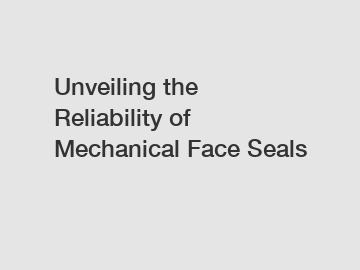Unveiling the Reliability of Mechanical Face Seals
Unveiling the Reliability of Mechanical Face Seals: A Game Changer in Industrial Settings?
In the realm of mechanical engineering, there's an ongoing quest to enhance the reliability and efficiency of various components. One critical area of focus is mechanical face seals. These seals are commonly used in rotating equipment, such as pumps and compressors, to prevent leakage and contamination. Over the years, engineers have strived to uncover the reliability of mechanical face seals, aiming to address concerns and improve performance. So, how reliable are these seals, and what factors influence their overall effectiveness?
2. Understanding Mechanical Face Seals:

Mechanical face seals, often referred to as radial shaft seals or floating seals, consist of two primary components: a stationary seal ring and a rotating seal ring. The two rings interface with each other, creating a dynamic seal that withstands shaft rotation. This arrangement is designed to prevent the escape of lubricants and to keep contaminants at bay. The modes in which mechanical face seals function include face sealing, circumferential sealing, and lubricating.
3. The Role of Material Selection:
The choice of materials plays a pivotal role in determining the reliability of mechanical face seals. Factors, such as pressure, temperature, and the surrounding environment, must be considered when selecting the appropriate materials. Generally, mechanical face seals are constructed using carbon, ceramic, or metal seal rings, combined with elastomer elements for effective sealing. However, it is crucial to balance material compatibility, wear resistance, and the ability to maintain adequate lubrication to ensure long-term reliability.
4. Operational Parameters and System Design:
Apart from material selection, the operational parameters and system design greatly influence the reliability of mechanical face seals. Factors like pressure differentials, rotational speed, and environmental conditions must be optimized for optimal performance. High rotational speeds can significantly impact the wear rate and frictional heat generated by the seals. Similarly, excessive pressure differentials can result in leakage or premature wear. Hence, comprehensive analysis and adherence to recommended operational guidelines are vital to ensure reliability.
5. Lubrication: The Key to Longevity:
Lubrication is fundamental in prolonging the lifespan and reliability of mechanical face seals. Proper lubricant selection, along with appropriate lubrication systems, ensures a continuous film of lubrication between the seal faces. This film acts as a protective layer, reducing wear and friction. Different applications require different lubrication methods, such as oil lubrication or grease lubrication. Consistent monitoring and maintenance of lubrication practices are crucial to avoid potential failures.
6. The Influence of Environmental Factors:
The reliability of mechanical face seals can also be affected by environmental factors. External contaminants, such as dirt, dust, or corrosive agents, can infiltrate the sealing interface and compromise its integrity. Additionally, extreme temperatures or humidity levels can lead to premature wear, seal degradation, or increased friction. Implementing appropriate sealing measures, such as environmental enclosures or proper ventilation, can significantly enhance the reliability of mechanical face seals.
7. Testing and Evaluation:
Rigorous testing and evaluation are crucial to validate the reliability of mechanical face seals. Experimental setups, such as dynamic tests, endurance tests, and seal performance analysis, can provide vital information regarding seal behavior and potential failure modes. Furthermore, computer-aided simulations and finite element analysis can complement physical testing, allowing engineers to assess the seals' reliability under various operating and stress conditions.
8. Conclusion:
Unveiling the reliability of mechanical face seals has become an essential pursuit in the field of mechanical engineering. Material selection, operational parameters, lubrication practices, and environmental factors all play significant roles in ensuring effective and durable sealing solutions. Engineers continually strive to optimize the design and performance of mechanical face seals through comprehensive testing and evaluation. By addressing these key factors, the reliability of mechanical face seals can be improved, leading to enhanced efficiency and reduced downtime in various industrial applications.
Contact us to discuss your requirements of custom fkm tc oil seal price, TC Type Oil Seal, custom made o rings. Our experienced sales team can help you identify the options that best suit your needs.
187
0
0

Comments
All Comments (0)